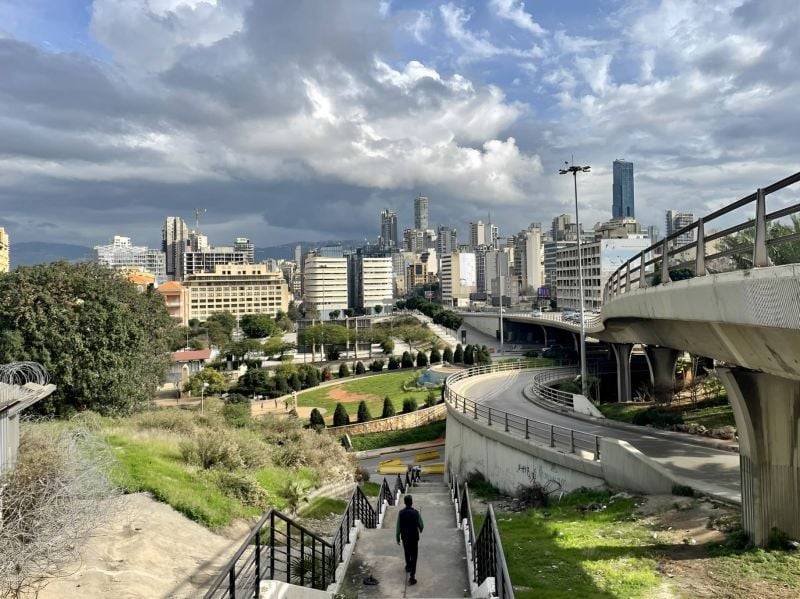
(Credit: Philippe Hage Boutros)
Bank Audi’s latest quarterly report on the Lebanese economy, released Saturday, can be summarized as unsettling and uncertain.
Under the leadership of economist Marwan Barakat, the bank’s research department assessed the first three months of 2023, marked by Lebanon’s persistent economic crisis.
“This political and economic status quo has resulted in macroeconomic uncertainties, intense currency pressures, and currency market drift,” noted the report, emphasizing that "investment is still at a low level.”
Due to the lack of precise data —public accounts have not been updated beyond the 2020 fiscal year —Bank Audi’s research department estimates that current investments account for less than 10 percent of GDP, in contrast to pre-crisis levels of more than 20 percent.
According to various estimates published by international organizations monitoring the country, Lebanon's GDP is approximately $20 billion.
Insight into the balance of payments
The report delves into an important indicator, balance of payments, that has garnered considerable attention within the local financial community since its publication by Banque du Liban (BDL).
This indicator measures the disparity between all the tangible, financial, and monetary asset transactions that occur between residents and non-residents of an economy within a specific timeframe.
The Bank Audi report examine Lebanon’s balance of payments for the first three months of 2023 and found a surplus of $1.175 billion.
This figure stands in stark contrast to the $3.197 billion deficit recorded for the entirety of 2022 — which aligns with the trend observed since the onset of the crisis in 2019 — indicating that the country typically spends more dollars than it receives.
Barakat explained to L’Orient-Le Jour that the unexpected surplus at the end of March is the result of the expansion of bank’s net external assets by $2.005 billion, combined with a contraction of $830 million in the net external assets of BDL.
The rise in the net foreign assets of the banking system is linked to a decrease in non-resident deposits, which were deducted from the sector’s liabilities, Barakat continued.
Out of the $1.9 billion drop in non-resident deposits considered in the calculation of the balance of payments, $1.8 billion was attributed to the Feb 1. change in the official exchange rate, when the official lira-to-dollar peg went from LL1,507.5 to LL15,000 on the dollar.
This seems to suggests that Lebanon’s surplus in the balance of payments at the end of March is not because the country received more funds from abroad than it transferred out.
Instead, the surplus appears to be the result of an accounting adjustment linked to the devaluation of non-residents’ deposits, caused by the change in the official exchange rate, and their subsequent deduction from the banks’ liabilities.
Decrease in deposits
Bank Audi’s report also highlighted several key details in the banking sector.
One notable point is the decline in foreign currency deposits held by banks, which have diminished by $29.5 billion since the onset of the crisis. As of the end of March, these deposits stood at $94.1 billion.
Additionally, lira deposits have experienced a significant decrease, plummeting by LL15 trillion during the same period. Lira deposits stood at at LL52.4 trillion by the end of March 2023.
Equity capital also fell by more than 75 percent from the end of October 2019 to the end of March this year, to just $4.9 billion.
This meltdown is caused by “net losses of banks over the period,” according to the report.
In addition to the Lebanese government’s default on Eurobonds in March 2020, banks also had to accept repayment of loans at below market value. Banks continue to impose informal restrictions on depositors since the fall of 2019, without the backing of a law establishing formal capital controls.
In terms of recommendations, the report’s authors said the priority is for authorities to draw up and pass a budget for 2023 “on the basis of a unified market exchange rate.”
Finally, the Bank Audi report emphasizes the necessity of reforming the electricity sector. Numerous plans for electricity sector reform were established since 2010, but never effectively implemented.
The report firmly asserts that restructuring the electricity sector to deliver affordable, environmentally friendly, and sustainable electricity is imperative to achieving economic recovery.
While acknowledging the Energy Ministry’s significant progress in recent months, such as tariff adjustments, the report’s authors identify five crucial areas that require attention: enhancing governance, cleaning up finances, augmenting production, developing renewable energy, and expanding grid investment through public-private partnerships.
This article was originally published in French in L'Orient-Le Jour. Translation by Sahar Ghoussoub.